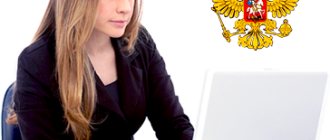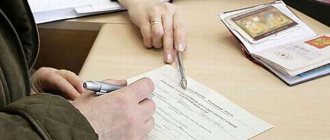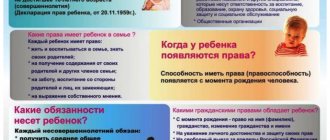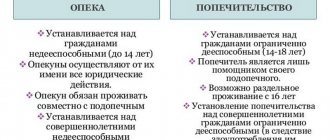Home / Family Law / Rights and Responsibilities / Children’s Rights
Back
Published: 04/27/2017
Reading time: 3 min
0
3626
Few people think that minor children have legal rights and responsibilities outlined by law. When parents divorce, these rights are most clearly expressed.
Like any other family member, a child has all the rights to common material assets and family property. But many do not understand where the line is between the rights of the child and the rights of the parents, which leads to conflicts and controversial issues between relatives.
Do your children have the right to inheritance and use of material resources when they reach adulthood? Can your child use your personal belongings and finances? Does a child have the right to his parents’ apartment?
The answers to these questions are in the Family Code of the Russian Federation. But in order to be well versed in the law and correctly interpret its main provisions, you need to be a specialist in the field of jurisprudence, in particular, family law.
Therefore, for those who are not specialists in the field of family law, we collect all the best and describe the nuances of the legislation. In this article, we will analyze in detail which actions your children have every right to, and which are completely unacceptable on their part.
- What property rights does a child have in the family? Personal belongings
- Benefits
- Alimony
Dear readers! To solve your problem, call hotline 8 or ask a question on the website. It's free.
Ask a Question
Types of rights
The law states that children have the right to a normal standard of living, which ensures their development. To create the necessary conditions, material costs are needed. The responsibility to provide for minors remains with the parents, who are legally responsible for financial support.
Art. 60 of the RF IC includes a list of property rights of children:
- material content;
- income;
- property received as an inheritance, as a gift;
- valuables purchased with the child’s personal money;
- possession and use of parents' property.
The parental home for children is considered a reliable place where there is not only psychological support, but also material support. If any property rights of children are violated, this is punishable by law. The state ensures the protection of the interests of minors.
Content
The property rights of a child in a family involve receiving financial support from parents or other adults who are legally responsible for this. The amount of maintenance is stated in section 5 of the RF IC. In the event of a divorce, children are entitled to child support, which is paid by the parent who does not live with the child.
The law establishes ownership of payments. Alimony, benefits, pensions must correspond to the required level to ensure a normal life for the child. Such payments are used not by children, but by parents. The funds received are spent on necessary purposes: upbringing, maintenance, education.
Children's right to maintenance
Legislative acts of the Russian Federation guarantee the right of children to be supported by their parents or guardians. Parents (persons replacing them) can freely choose the form and order of child support. Both spouses must support the minor, regardless of their status and financial capabilities. If parents do not provide adequate support for their children, they are required to collect funds from them to support the child - alimony.
These postulates are set out in Articles 80-86 of the Family Code of the Russian Federation.
Also, in the absence of parents, the maintenance of young children is entrusted to the closest relatives. Grandparents are required to take care of grandchildren under the age of eighteen (Article 94 of the Family Code of the Russian Federation). Adult brothers/sisters are subject to the same obligations in relation to their minor and incapacitated brothers or sisters. In such cases, the above-mentioned persons should formalize guardianship over dependent persons (Article 93 of the Family Code of the Russian Federation).
If there are disabled children in the family, the parents or persons replacing them, along with the maintenance of their wards, are obliged to ensure that they are provided with appropriate conditions for development, upbringing and education (Article 86 of the Family Code of the Russian Federation).
Children who are left orphans also have the right to receive child support from their guardians. This right is guaranteed by Article 148 of the RF IC. In case of violation of the rights of orphans, guardians are held administratively liable.
Required payments
The property rights of children require the payment of the following payments:
- alimony;
- disability and survivor pensions;
- state benefits.
Parents must fulfill the responsibilities of managing the funds intended for their children. Such measures are approved to protect against violations and abuses. For example, unscrupulous parents spend money on personal purposes that do not relate to the upbringing and development of minors.
To protect the rights of children, Art. 60 of the RF IC states that with the claim of the alimony payer, the judge can establish a mandatory transfer of no more than 50% of the amount to current accounts. They are opened in banks for minor children. Such a decision is made by the court at the request of the payer, taking into account the interests of the child.
Commentary to Art. 60 IC RF
1. The commented article is devoted to the property rights of the child, regulated by family law. It should be borne in mind that in addition to family law, these rights are also regulated by civil and housing legislation.
The property rights of a child established by family law can be divided into the right to receive maintenance from his parents and other family members, the right of ownership of income received by him, and the right to property acquired with the child’s funds.
Paragraph 1 of the commented article talks about such a property right of a child as the right to receive maintenance from his parents and other family members. In this case, maintenance means the satisfaction of such vital needs of the child as food, clothing, housing, etc.
Typically, such maintenance is provided by parents from their earnings (other income) not as a legal, but as a moral obligation. However, in case of failure to fulfill this obligation voluntarily, such maintenance is collected in court (in the absence of an agreement on the payment of alimony) from the parent obligated to pay alimony, and if the child is unable to receive maintenance from his parents - from other family members (adult brothers, sisters, grandmothers, grandfathers).
The issues of providing maintenance to children by parents and other family members will be discussed in more detail below (see commentary to Section V).
2. There may be situations when a child, living with one or two parents, has the right to receive additional amounts of money. Money for minors can come in the form of pensions, alimony or benefits. Thus, a minor may be assigned a disability pension (Articles 5, 8 of the Federal Law on Labor Pensions in the Russian Federation), a labor pension in the event of the loss of a breadwinner (Clause 3, Article 8, Clause 4, Article 10, Article 13 of the Federal Law of December 15, 2001 N 166-FZ “On state pension provision in the Russian Federation”, Article 9 of the Federal Law “On Labor Pensions in the Russian Federation”), social pension in case of loss of a breadwinner (clause 1 of Article 11 of the Federal Law “On State Pension Provision in the Russian Federation”).
Income and property
The property rights of children imply that they can be the owners of personal income and property. A child can receive property by inheritance, as a gift, or under a sales contract. In practice, there are other types of relationships by which property can be transferred into ownership. For example, housing may become the property of privatization. The parental home is inherited by the children.
Possession can be taken over the premises in which only minors live. If the child is under 14 years old, then privatization is carried out on the basis of an application from the parents with the permission of the guardianship authorities. Housing in which only a minor over 14 years of age lives is transferred to ownership based on the teenager’s application. Only parents and guardianship authorities must agree to this.
If children do not have parents due to death or other factors, then the guardianship authorities must, within 3 months, draw up documents on the transfer of housing into the child’s possession. The property rights of minor children related to the disposal of property are determined by their civil capacity.
Conducting transactions under the control of guardianship authorities
There are certain types of transactions with property, the commission of which is impossible without the consent of the guardianship authorities. These include:
- Sale of real estate in which a minor acts as a co-owner;
- Change of living conditions;
- Donation of a real estate property belonging to a child;
- Pledge of property that is the property of a minor;
- The emergence of rental legal relations, the subject of which is the property of a minor;
- Exchange of children's property;
- Refusal of inheritance and allocation of a share from an object owned by a minor;
- Sale of real estate that is the property of a disabled child or orphan;
- Other operations aimed at reducing the amount of property of a minor.
USEFUL INFORMATION: Personal rights of a minor child
Failure to obtain the consent of these authorities to carry out transactions or ignoring their opinion will lead to lawsuits to limit parental rights in relation to the child’s property.
Child's capacity
The legal capacity of children, approved in the Civil Code of the Russian Federation, is determined by age. Until 6 years of age, there is no civil capacity, so there is no possibility of disposing of property without the consent of representatives. From 6 to 14 years of age, limited civil legal capacity applies, so you can make small everyday transactions. These include the purchase of food and school meals.
A minor can make transactions that do not require notarization and state registration. Children have the right to handle money provided by their parents. Funds may be issued to minors for specific purposes. This means that legal capacity is limited. Other transactions are made with parents. Legal representatives are responsible for harm caused by children.
From 14 to 18 years of age, extended legal capacity applies, so it is possible to carry out small household transactions, manage your money, and a scholarship. Minors of this age can exercise copyrights. They have the right to make deposits in credit institutions. Other transactions are made with the written permission of the parents. And when this rule is violated, the actions taken are considered invalid. Teenagers from 14 years of age bear financial responsibility for harm caused.
Property rights of minors
Throughout the social studies course, students learn the fundamental concept of law. In modern society, rights related to property relations are very relevant, both in adult life and in the life of minors. The fundamental normative document in this matter is the Family Code as one of the sources containing the norms of family law studied in the school curriculum. Article 60 of the Family Code gives the child the following property rights:
a) the right to receive maintenance from their parents and other family members (i.e., adult able-bodied brothers and sisters, grandparents);
b) the right of ownership of the income received by him, property received by him as a gift or by inheritance, and any other property acquired with the child’s funds;
c) the right to own and use the property of parents when living together with them (by mutual consent of the child and parents).
When studying the economic sphere of life, students who do not have full legal capacity are always interested in the question of what is allowed to them by law. Children aged 6 to 14 years have the right to independently carry out small household transactions - buy food, textbooks, notebooks, etc.; accept a bicycle from your grandfather as a gift; buy a player with the money given by my father.
Children aged 14 to 18 years have the right to independently, without the consent of their parents (persons replacing them), dispose of their earnings, scholarships, and other income; exercise the rights of the author of a work of science, literature or art, invention or other result of his intellectual activity protected by law; make deposits in banks and other credit institutions and manage them; make any transactions permitted for children from 6 to 14 years old; from the age of 16 ˗ join a cooperative. They may carry out transactions not mentioned here, but only with the written consent of their legal representatives.
A child may have the right of ownership not only of property received by him as a gift or by inheritance, but also income (earnings) received by him, as well as property acquired with the child’s funds. The amounts of alimony, pensions and benefits due to the child received by parents (persons replacing them) are also the property of the child. A child can become the owner of property for other reasons. For example, as a result of the privatization of residential premises, there is a free transfer into the ownership of citizens of the residential premises they occupy under a social tenancy agreement in the state and municipal housing stock.
This is important to know: Division of inherited property
The law enshrines the principle of separation of property between parents and children, meaning that the child does not have the right of ownership to the property of the parents, and the parents do not have the right of ownership to the property of the child. However, children and parents living together may own and use each other's property by mutual consent.
When studying the paragraph “System of Law,” students are faced with such concepts as branches of law, civil law, the Civil Code, and the concept of “inheritance.” If there are minor citizens among the heirs, the division of the inheritance is carried out in compliance with the rules of Article 37 of the Civil Code. In order to protect the legitimate interests of minor heirs, the law establishes a requirement according to which the guardianship and trusteeship authority must be notified of the drawing up of an agreement on the division of the inheritance and of the consideration of the case on the division of the inheritance in court.
The material was prepared by the methodologist of the State Medical Center for Dog and Animal Medicine M.V. Ryazantsev
Disposal of property
The child has the right of ownership of the property. He can manage his things. Almost all transactions can be made with parents. The exceptions include a small list of actions that can be performed independently:
- small household transactions;
- receiving benefits free of charge, which does not require notarization;
- disposal of money provided by parents or other relatives.
The disposal of property is a legal right. If it is violated, violators are held accountable.
Property rights of minor children
In accordance with Art. 27 of the Convention on the Rights of the Child, every child has the right to a standard of living adequate for his physical, mental, spiritual, moral and social development. This standard of living is provided to the child by parents, and on a voluntary basis.
The property rights of minor children are regulated by Art. 60 of the RF IC, according to which minors are endowed with the following rights:
- • to receive maintenance from their parents and other family members (alimony, pensions, child support). So, according to paragraph 2 of Art. 60 of the RF IC, at the request of a parent obligated to pay alimony for minor children, the court has the right to make a decision to transfer no more than 50% of the alimony amounts to be paid to accounts opened in the name of minor children in banks;
- • obtaining ownership of any property (for example, transferring real estate to a minor).
A child has the right of ownership of income received by him, property received by him as a gift or by inheritance, as well as any other property acquired with the child’s funds.
The right of minors to dispose of their property is regulated by civil law, according to which minors can independently make transactions. So, in accordance with Art. 26 of the Civil Code of the Russian Federation, minors aged 14 to 18 years make transactions with the written consent of their legal representatives - parents, adoptive parents or guardian. However, minors aged 14 to 18 years have the right to independently, without the consent of parents, adoptive parents and guardians:
- • manage your earnings, scholarships and other income;
- • exercise the rights of the author of a work of science, literature or art, invention or other result of his intellectual activity protected by law;
- • make deposits in credit organizations and manage them;
- • make small household transactions and other transactions.
Upon reaching 16 years of age, minors also have the right to be members of cooperatives.
According to Art. 28 of the Civil Code of the Russian Federation, for minors under 14 years of age (minors), transactions can be made on their behalf only by their parents, adoptive parents or guardians. However, minors aged 6 to 14 years have the right to independently:
- • small household transactions;
- • transactions aimed at obtaining benefits free of charge, which do not require notarization or state registration;
- • transactions for the disposal of funds provided by a legal representative or with the consent of the latter by a third party for a specific purpose or for free disposal.
When parents exercise powers to manage the child’s property, they are subject to the rules established by civil legislation regarding the disposal of the property of the ward (Article 37 of the Civil Code of the Russian Federation).
According to Art. 37 of the Civil Code of the Russian Federation, a guardian or trustee disposes of the income of the ward, including income due to the ward from the management of his property, with the exception of income that the ward has the right to dispose of independently, exclusively in the interests of the ward and with the prior permission of the guardianship and trusteeship authority. Amounts of alimony, pensions, benefits, compensation for harm to health and harm incurred in the event of the death of the breadwinner, as well as other funds paid for the maintenance of the ward, with the exception of income that the ward has the right to dispose of independently, are subject to credit to a separate nominal account opened by the guardian or trustee, and are spent by the guardian or trustee without the prior permission of the guardianship and trusteeship authority. The guardian or trustee provides a report on the expenditure of amounts credited to a separate nominal account.
The guardian does not have the right, without the prior permission of the guardianship and trusteeship body, to carry out, and the trustee to give consent to carry out transactions for the alienation, including the exchange or donation of the ward’s property, leasing it, for free use or as a pledge, transactions that entail refusal from the rights belonging to the ward, the division of his property or the allocation of shares from it, as well as any other actions entailing a decrease in the property of the ward.
Carrying out transactions
Many transactions are carried out with the consent of the parents, who must draw up written permission. If this requirement is violated, the transaction may be declared invalid through the court. Consent to it presupposes that the minor’s representative has familiarized himself with the conditions and also learned about the consequences.
Parents cannot enter into transactions that reduce the child's property. The permission of elders is necessary when drawing up a contract of sale, exchange, or gift. The document is also needed to carry out operations with privatized meters where children live. When carrying out transactions with real estate where the child lives, the funds received are transferred to the bank account of the minor. He can use these funds later. The benefits received are transferred to parents, who must spend them on the needs of their children.
Basic rights
There are not only personal property rights of parents and children, but also non-property rights. From the moment of birth, a person’s interests are protected by the state. The child has the right to:
- surname, first name, patronymic;
- family education;
- communication with relatives;
- change of surname and first name;
- property;
- protection of interests;
- medical assistance;
- personal opinion;
- education.
These are just the basic rights; in fact, there are more. Their provision falls on parents and the state. An important task is to protect interests. The main aspects of these issues are included in the legislation.
Judicial protection of property and non-property rights of children
The second article of the Constitution of the Russian Federation states the duty of the state to recognize, respect and protect human rights. Judicial protection of a citizen is guaranteed by Article 118 of the Constitution. The Family Code of the Russian Federation provides for the protection of children's rights in court. Such cases include:
- Collection of alimony from parents/guardians in the event of the latter’s refusal to support the child;
- Legal proceedings related to violation of the property rights of minors and changes in living conditions;
- Litigation regarding violations of the rights of orphans and adopted children;
- Court hearings due to violations of the rights of disabled children and children with disabilities;
- Violation of the non-property rights of minors (the right to education, change of surname and first name, to communicate with both parents in the event of divorce, etc.).
In all of these cases, the representation of the child falls within the competence of the guardianship and trusteeship authorities.
Protection of rights
Rules for ensuring the protection of children's interests are included in regulations. The main one is the Constitution. Protection of children's property rights, as well as non-property rights, is necessary to maintain order. The law outlines provisions to ensure the protection of children from the abuse of adults.
Since parents or legal representatives are involved in raising minors, it is important to protect the child from their abuse. When children are abused by adults, they can complain to the guardianship authorities. From the age of 14 you have the opportunity to go to court.
Parents and other citizens
The interests of the child are protected by the mother and father. But in some situations such powers are vested in the guardianship authorities. This happens when parents are deprived of their rights to raise children. They may be disabled or abuse alcohol. Social protection of the interests of minors is carried out by officials and other citizens. If there is a threat to the life or health of the child, then it is necessary to tell the guardianship authorities about this. This phenomenon must be eliminated.
Criminal liability
The protection of children's interests is controlled by the Criminal Code. According to Art. 156 defines liability for failure to fulfill educational obligations if there was cruelty to a minor. Such actions include humiliation, beatings, and deprivation of food. Guardianship authorities monitor the fulfillment of their duties by parents. If non-compliance is discovered, the responsible persons are punished.
If the rights of a child who is in the care of an educational institution are violated, educators and management are responsible for this. A fine may be imposed and restrictions on freedom may be imposed. Sometimes a decision is made to deprive someone of their position. Because of abuse, parents may be deprived of their rights to raise a child.
Child's right to education
The right of a citizen to receive a quality education is guaranteed, first of all, by Article 43 of the Constitution of the Russian Federation. This article examines the general availability of free education in preschool, general education and secondary vocational educational institutions. Every citizen is obliged to receive basic general education.
Article 29 of the Convention on the Rights of the Child also addresses the child's right to free education. The upbringing and education of children should be aimed at the formation of a comprehensively developed personality, the development of moral, aesthetic, mental and physical qualities, as well as the preparation of a minor for conscious life. Children of all categories (including orphans, disabled children and children with disabilities) have the right to education.
Adopted in 1992 (edited in 2004), the Law of the Russian Federation “On Education” considers the right to education of all citizens of the Russian Federation, regardless of gender, race, nationality, native language, age and health status. Thus, the right to education is guaranteed to everyone - both healthy individuals and disabled people. Moreover, the state is obliged to create all conditions for citizens with disabilities to receive education and upbringing that correspond to their physical and mental capabilities.
Article 18 of the Law “On Education” considers preschool education as the initial type of child upbringing. As a rule, it is carried out in preschool institutions and is free for different segments of the population and categories of children (orphans, disabled children, etc.).
The Law “On Education” guarantees that children receive education, from preschool (Article 18) to higher vocational education (Article 24). Parents (or guardians) have the right to choose the form of upbringing and education for the child (taking into account his opinion) until he receives basic general education. Parents are also obliged to provide their children with conditions for optimal education.
In addition, the child’s right to receive education is also considered in the Family Code of the Russian Federation. It is Article 63 that places responsibility for the upbringing and education of children on their parents, or persons who replace them.
And finally, paragraph 1 of Article 9 of the Law of the Russian Federation “On Basic Guarantees of the Rights of the Child in the Russian Federation” prohibits infringement of the right to preschool, general and educational education.
In case of violations of children's rights, the law provides for administrative/criminal liability.
Activities of the prosecutor's office and police department
The interests of children are also protected by law enforcement agencies. These include the prosecutor's office and the police department. This work is performed using the following methods:
- filing a claim for deprivation of parental rights;
- participation in a court hearing;
- warning about possible violation of children's rights;
- filing an application for restoration of the infringed right;
- protesting acts of administrative bodies.
Departments of Internal Affairs are also working to implement decisions related to the search for persons evading the responsibility to raise children. Authorities carry out preventive work with parents. The protection of the interests of children in Russia is carried out by a special commission. She is suing for restriction and deprivation of parental rights. Employees also take measures to restore the rights of children, prepare information for the court, and monitor their education.
Children's rights are among the most important in the country, so they are strictly controlled. With their support, minors can fully develop. The protection of rights is controlled by the UN, which works on the basis of the Convention. Russia provides the committee with information about the situation of children in the country. Therefore, all difficult situations in which minors find themselves must be eliminated.










